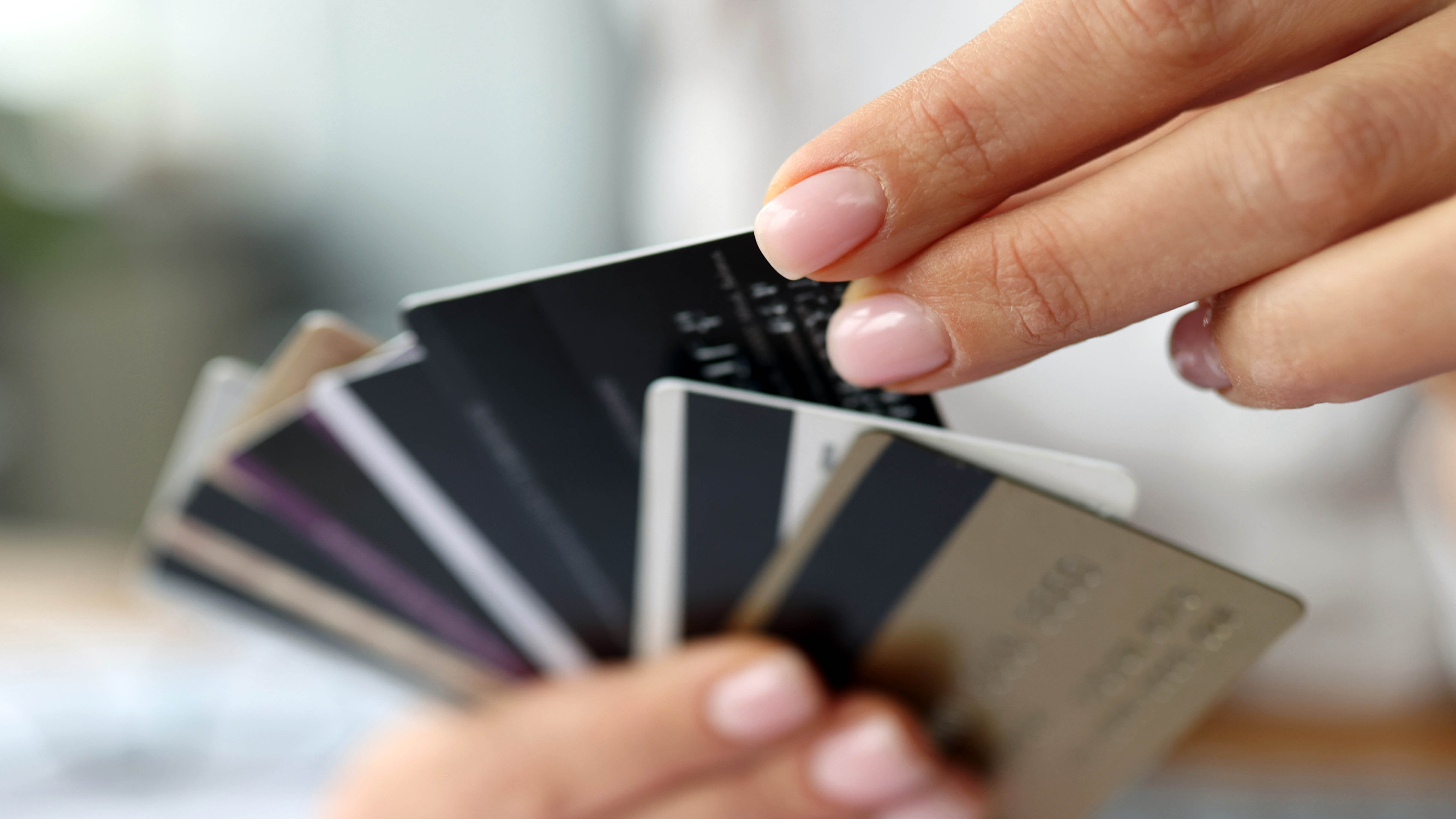How To Choose a Credit Card for You
Choose a credit card to improve your credit score, save money, or earn rewards — but don’t get in over your head.

Erin Bendig

Profit and prosper with the best of Kiplinger's advice on investing, taxes, retirement, personal finance and much more. Delivered daily. Enter your email in the box and click Sign Me Up.
You are now subscribed
Your newsletter sign-up was successful
Want to add more newsletters?

Delivered daily
Kiplinger Today
Profit and prosper with the best of Kiplinger's advice on investing, taxes, retirement, personal finance and much more delivered daily. Smart money moves start here.

Sent five days a week
Kiplinger A Step Ahead
Get practical help to make better financial decisions in your everyday life, from spending to savings on top deals.

Delivered daily
Kiplinger Closing Bell
Get today's biggest financial and investing headlines delivered to your inbox every day the U.S. stock market is open.

Sent twice a week
Kiplinger Adviser Intel
Financial pros across the country share best practices and fresh tactics to preserve and grow your wealth.

Delivered weekly
Kiplinger Tax Tips
Trim your federal and state tax bills with practical tax-planning and tax-cutting strategies.

Sent twice a week
Kiplinger Retirement Tips
Your twice-a-week guide to planning and enjoying a financially secure and richly rewarding retirement

Sent bimonthly.
Kiplinger Adviser Angle
Insights for advisers, wealth managers and other financial professionals.

Sent twice a week
Kiplinger Investing Weekly
Your twice-a-week roundup of promising stocks, funds, companies and industries you should consider, ones you should avoid, and why.

Sent weekly for six weeks
Kiplinger Invest for Retirement
Your step-by-step six-part series on how to invest for retirement, from devising a successful strategy to exactly which investments to choose.
It's true that credit cards can pose a financial risk, but if you choose a credit card wisely, you may get benefits otherwise unattainable to you. This is especially true if you opt for some of the best rewards credit cards. Currently, credit card debt is surging in the U.S. as consumers struggle to keep up with inflation and rising interest rates.
How to choose a credit card
With so many types of credit cards on the market, no card is right for everyone. In fact, there probably isn’t even one best card for you. When choosing a credit card, the key is to start with an understanding of where you are now.
What is your credit profile and your top goal for owning a card? Do you need to improve your credit? Are you planning a large purchase or hoping to transfer a balance from another credit card with high interest rates? Or do you have your eye on cashback or travel rewards via a rewards credit card? A little soul-searching before your credit card research can pay off in the long run.
Here are the questions to consider before choosing a credit card.
From just $107.88 $24.99 for Kiplinger Personal Finance
Become a smarter, better informed investor. Subscribe from just $107.88 $24.99, plus get up to 4 Special Issues

Sign up for Kiplinger’s Free Newsletters
Profit and prosper with the best of expert advice on investing, taxes, retirement, personal finance and more - straight to your e-mail.
Profit and prosper with the best of expert advice - straight to your e-mail.
1. What is your credit score?
A FICO score, often called a credit score, measures your creditworthiness on a scale from 300 to 850, where a higher score is better. Major banks, credit unions, and credit card companies often provide a free FICO score to their customers. If you can’t find a FICO score there, you may access one for free at the credit bureau Experian, or by using the new way to see free FICO credit scores from Equifax. Checking your FICO score will not lower your credit score.
If your FICO score is above 670, you are considered to be a “good” or better credit risk. A good credit score may qualify you for cards with lower interest rates, rewards, or other benefits. If your FICO score is below 670, you have “fair” or even “bad” credit and will need to apply to cards that can improve your credit score. Check out Kiplinger's picks for best credit cards for bad credit.
2. Do you want to earn cash back or rewards?
If you have good credit or better, you may qualify for a variety of rewards credit cards that can boost your purchasing power. These rewards cards may have some (or many) of the following features.
- A fixed amount of cash-back on all purchases (several issuers offer around 2%).
- Cash-back for purchases in specific categories, such as 5% back on groceries.
- Points or miles for travel, such as for flights, hotel stays, and car rentals.
- A sign-up bonus if you spend a certain amount in the first few months.
- Some rewards cards have an annual fee.
- In some cases, green credit cards reward more sustainable purchases.
Some of the best rewards credit cards can help pay for your next vacation, holiday shopping, or necessities. Just make sure you can pay off your credit card bill in full every month, or your interest payments may wipe out any benefits you get from a rewards program.
3. Do you want to consolidate your debt?
If you cannot pay your credit card bill in full each month, you are said to be “carrying a balance.” If you're carrying a balance on a card with a high interest rate, you need to plan your next move carefully. If your card’s interest rate is double digits, paying the minimum payment each month is not a long-term solution, and can even push you into a downward debt spiral.
By getting a balance transfer credit card with a 0% introductory APR (annual percentage rate), you buy yourself time to pay off the debt.
When selecting this type of credit card, you should keep in mind the balance transfer fee (usually between 3% to 5% of the total transfer amount) and how long you have to pay off the debt before the interest rate increases.
4. Are you a student?
If you are a student with little or no credit history, a credit card can help you gradually grow your credit score. In the past, students were typically shut out of rewards programs, but now you can select from a variety of student credit cards. However, if you think you may have trouble paying your monthly credit card bill in full and on time, you might do better to stick with a debit card.
5. Do you need to increase your credit score?
The past few years have been financially difficult for many Americans. If you have dinged your credit score by missing payments or by failing to pay bills on time, you are not alone. There are options for improving your credit but, as with most things in life, know that there are no quick fixes.
One of the best ways to repair a bad credit score is with a “secured” credit card. A credit card is “secured” when the borrower pays an upfront deposit that the lender typically holds for the entire time the account is open. Deposit amounts may vary but generally are between $200 and $300. Some cards, called “low-deposit credit cards,” start with smaller deposits, such as $49, and help borrowers gradually increase their deposit amount.
The “line of credit,” or the total amount a lender can borrow, is likely to be the same as the deposit amount or a bit higher. Read our detailed guide on how to get a credit card with bad credit for more information.
How to apply for a credit card
By now you should know your FICO score and your credit card goals, as well as the best card options for you. Keep in mind that when you apply for a credit card, the issuer will conduct a “hard pull,” meaning it will ask one of the three credit bureaus for your credit report and your credit score will decline for a period of time.
To avoid a hard pull, you can ask the bank issuing the card (or look on the bank’s website) for a prequalification — a quick check of your credit in a way that will not damage your credit score. Alternatively, you can use our card match tool below — in partnership with Bankrate — to compare your eligibility for credit cards. You'll get offers that are personalized to your situation, but a soft credit check will be carried out, without impacting your credit score.
Related Content
Profit and prosper with the best of Kiplinger's advice on investing, taxes, retirement, personal finance and much more. Delivered daily. Enter your email in the box and click Sign Me Up.

Ellen writes and edits retirement stories. She joined Kiplinger in 2021 as an investment and personal finance writer, focusing on retirement, credit cards and related topics. She worked in the mutual fund industry for 15 years as a manager and sustainability analyst at Calvert Investments. She earned a master’s from U.C. Berkeley in international relations and Latin America and a B.A. from Haverford College.
- Erin BendigPersonal Finance Writer
-
 Dow Adds 1,206 Points to Top 50,000: Stock Market Today
Dow Adds 1,206 Points to Top 50,000: Stock Market TodayThe S&P 500 and Nasdaq also had strong finishes to a volatile week, with beaten-down tech stocks outperforming.
-
 Ask the Tax Editor: Federal Income Tax Deductions
Ask the Tax Editor: Federal Income Tax DeductionsAsk the Editor In this week's Ask the Editor Q&A, Joy Taylor answers questions on federal income tax deductions
-
 States With No-Fault Car Insurance Laws (and How No-Fault Car Insurance Works)
States With No-Fault Car Insurance Laws (and How No-Fault Car Insurance Works)A breakdown of the confusing rules around no-fault car insurance in every state where it exists.